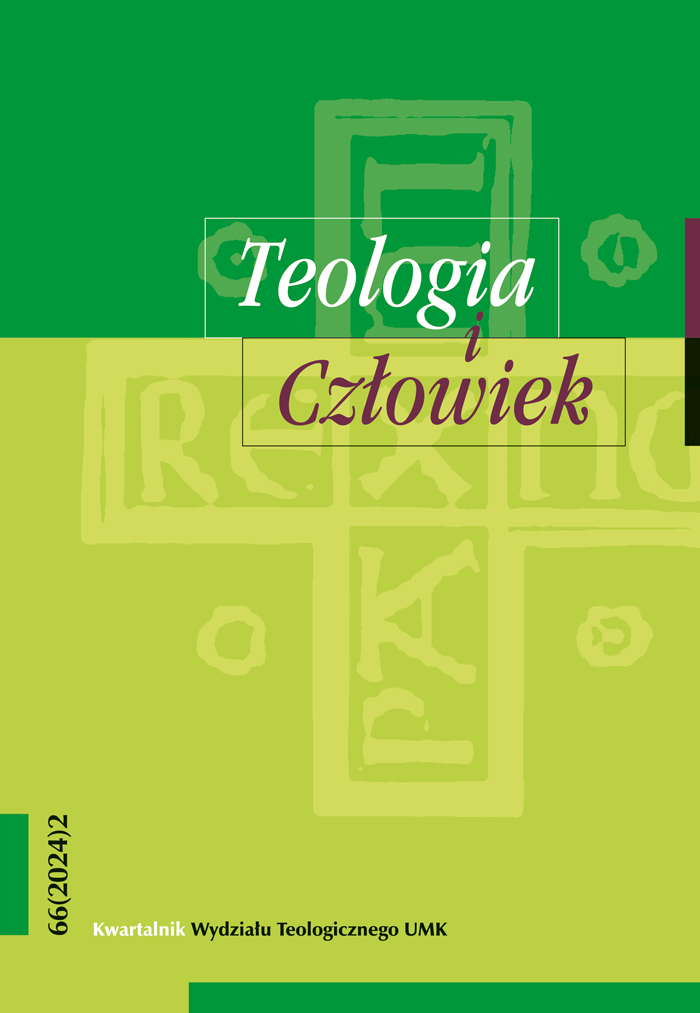Benedict Hesse of Cracow’s Question about Dispensation from Religious Vows from His Commentary on Matthew’s Gospel: Study and Critical Edition
DOI:
https://doi.org/10.12775/TiCz.2024.008Słowa kluczowe
Benedykt Hesse z Krakowa, dyspensa, śluby zakonne, Unwersytet Krakowski, XV wiek, Biblioteka JagiellońskaAbstrakt
Kwestia Benedykta Hessego dotycząca dyspensy od ślubów zakonnych z jego komentarza do Ewangelii wg św. Mateusza. Analiza i edycja krytyczna
Artykuł omawia pochodzącą z lat 1431–1456 kwestię dotyczącą dyspensy od ślubów zakonnych autorstwa Benedykta Hessego z Krakowa, zachowaną w manuskrypcie Kraków, BJ, 1369, ff. 26v–28v. Opierając się na myśli Tomasza z Akwinu, Hesse twierdzi, iż nie ma możliwości dyspensowania mnicha od trzech ślubów zakonnych. Ślub posłuszeństwa może być zmieniony stosownie do okoliczności, ale nie można od niego dyspensować. Uroczyście obiecana czystość musi być zawsze zachowywana przez mnicha, nawet jeśli istnieje możliwość dyspensowania księdza diecezjalnego od jego obowiązku zachowania celibatu. Ubóstwo także należy do istoty życia religijnego, dlatego nie można od niego dyspensować i każdy mnich, nawet opat, jest zobowiązany do przestrzegania tego ślubu.
Bibliografia
Manuscripts
Kraków, Biblioteka Jagiellońska
, 1366, 1368, 1369
Città del Vaticano, Biblioteca Apostolica Vaticana
Vat.lat.14646
Medieval texts
Benedictus Hesse de Cracovia. “Tractatus brevior.” In Polskie traktaty koncyliarystyczne z połowy XV wieku, edited by Wacław Bucichowski, 29–42. Warszawa: Akademia Teologii Katolickiej, 1987. (Textus et studia historiam theologiae in Polonia excultae spectantia, 23).
Studies
Baran, Wojciech. “Benedict Hesse of Cracow’s Question about the Resurrection from the Commentary to Matthew’s Gospel”. Study and Critical Edition, forthcoming.
Baran, Wojciech. “Les Principia aux Sentences de Benoît Hesse de Cracovie (1428–1430).” Etude et édition critique, forthcoming.
Baran, Wojciech. The lectio ultima on Peter Lombard’s Sentences of Benedict Hesse of Cracow (1389–1456). An example of the relationship between the principia and the lectio ultima. Case study and critical edition, forthcoming.
Brînzei Calma M., La définition du viator dans les commentaires des Sentences au XIVe siècle, in: Les innovations du vocabulaire latin à la fin du Moyen Âge : autour du Glossaire du latin philosophique (philosophie, théologie, science), edited by Olga Weijers, Iacopo Costa, and Adriano Oliva, 45–59. Turnhout: Brepols, 2010.
Bucichowski, Wacław, ed. Polskie traktaty koncyliarystyczne z połowy XV wieku. Warszawa: Akademia Teologii Katolickiej, 1987 (Textus et studia historiam theologiae in Polonia excultae spectantia, 23).
Bukała Marcin, Benedictus Hesse de Cracovia. De contractibus censuum reempcionum. Wstęp / Editoris Nota. Warszawa: …………?, 2015.
Catalogus codicum manuscriptorum medii aevi Latinorum, qui in Bibliotheca Jagellonica Cracoviae asservantur, edited by Maria Kowalczyk, Anna Kozłowska, Mieczysław Markowski, and others, vol. 9. Cracoviae: Bibliotheca Jagellonica, Księgarnia Akademicka, 2008.
Chmielowska, Bożena. „Traktat Mateusza z Krakowa jako źródło w komentarzu Benedykta Hessego do Ewangelii św. Mateusza.” Przegląd Tomistyczny 14 (2008): 169–185.
Fijałek, Jan. Studia do dziejów Uniwersytetu Krakowskiego i jego Wydziału Teologicznego w XV wieku. Kraków: Akademia Umiejętności, 1898.
Rechowicz, Marian. Święty Jan Kanty i Benedykt Hesse w świetle krakowskiej kompilacji teologicznej z XV w. Lublin: Towarzystwo Naukowe Katolickiego Uniwersytetu Lubelskiego, 1958.
Markowski Mieczysław. Dzieje Wydziału Teologii Uniwersytetu Krakowskiego w latach 1397–1525. Kraków: Wydawnictwo Naukowe Papieskiej Akademii Teologicznej, 1996.
Ozorowski, Mieczysław. „Życie i działalność Benedykta Hessego.” Studia Teologiczne 16 (1998): 79–92.
Poirel, Dominique. Stemma codicum. La « méthode Froger » d’édition critique. Turnhout: Brepols, 2022 (Brepols Essays in European Culture 6).
Slotemaker J. T., “Henry of Gorkum’s Conclusiones Super IV Libros Sententiarum: Studying the Lombard in the First Decades of the Fifteenth Century.” In Mediaeval Commentaries on the Sentences of Peter Lombard, edited by Philipp W. Rosemann, vol. 3, 145–173. Leiden: Brills, 2015.
Wielgus, Stanisław. “Benedykt Hesse.” In Encyklopedia filozofii polskiej, edited by Andrzej Maryniarczyk and others, vol. 1, 94–96. Lublin: Polskie Towarzystwo Tomasza z Akwinu, 2002, http://www.ptta.pl/pef/pdf/b/benedykth.pdf (last accessed 02.04.2024), English version: http://www.ptta.pl/pef/haslaen/b/benedykthesse.pdf (last accessed 02.04.2024).
Wisłocki, Władysław. Katalog rękopisów Biblijoteki Uniwersytetu Jagiellońskiego, 2 vol. Kraków: Akademia Umiejętności, Drukarnia Uniwersytetu Jagiellońskiego, 1877–1881, vol. 1: https://jbc.bj.uj.edu.pl/dlibra/publication/297832/edition/285039/content (last accessed 02.04.2024); vol. 2: https://jbc.bj.uj.edu.pl/dlibra/publication/297833/edition/285040/content (last accessed 02.04.2024).
Wojtczak, Hanna. „Benedykt Hesse – przedstawiciel naukowego środowiska krakowskiego w pierwszej połowie XV wieku.” Folia Philosophica 30 (2012): 69–88.
Wojtczak, Hanna. Benedykta Hessego Komentarz do Kategorii Arystotelesa, część 1. Lublin: Towarzystwo Naukowe KUL, 2019.
Wojtczak, Hanna. „Komentarze Benedykta Hessego do Ars Vetus w świetle nowych ustaleń.” Przegląd Tomistyczny 24 (2018): 595–609.
Pobrania
Opublikowane
Jak cytować
Numer
Dział
Licencja
Prawa autorskie (c) 2024 Wojciech Dariusz Baran

Utwór dostępny jest na licencji Creative Commons Uznanie autorstwa – Bez utworów zależnych 4.0 Międzynarodowe.
CC BY ND 4.0. Posiadaczem prawa autorskiego (Licencjodawcą) jest Autor, który na mocy umowy licencyjnej udziela nieodpłatnie prawa do eksploatacji dzieła na polach wskazanych w umowie.
- Licencjodawca udziela Licencjobiorcy licencji niewyłącznej na korzystanie z Utworu/przedmiotu prawa pokrewnego w następujących polach eksploatacji: a) utrwalanie Utworu/przedmiotu prawa pokrewnego; b) reprodukowanie (zwielokrotnienie) Utworu/przedmiotu prawa pokrewnego drukiem i techniką cyfrową (e-book, audiobook); c) wprowadzania do obrotu egzemplarzy zwielokrotnionego Utworu/przedmiotu prawa pokrewnego; d) wprowadzenie Utworu/przedmiotu prawa pokrewnego do pamięci komputera; e) rozpowszechnianie utworu w wersji elektronicznej w formule open access na licencji Creative Commons (CC BY-ND 3.0) poprzez platformę cyfrową Wydawnictwa Naukowego UMK oraz repozytorium UMK.
- Korzystanie przez Licencjobiorcę z utrwalonego Utworu ww. polach nie jest ograniczone czasowo ilościowo i terytorialnie.
- Licencjodawca udziela Licencjobiorcy licencji do Utworu/przedmiotu prawa pokrewnego nieodpłatnie na czas nieokreślony
PEŁEN TEKST UMOWY LICENCYJNEJ >>
Statystyki
Liczba wyświetleń i pobrań: 280
Liczba cytowań: 0



